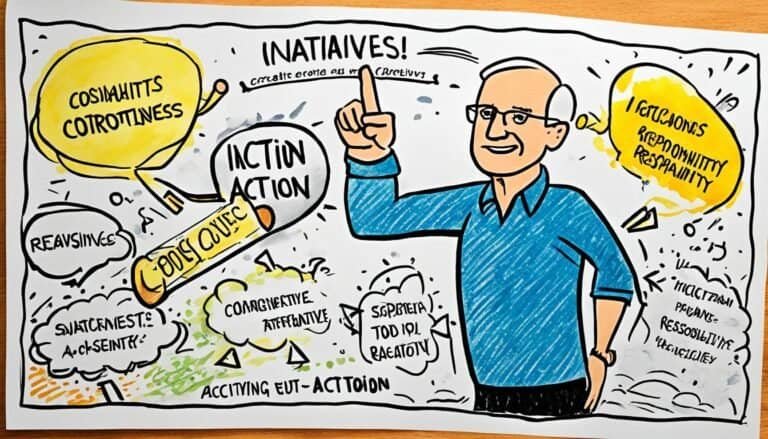Lissa Rankin’s Key Insights for Personal Growth
|
Getting your Trinity Audio player ready...
|
“The most powerful relationship you will ever have is the relationship with yourself.” – Diane von Furstenberg
When it comes to personal growth, there is no one-size-fits-all approach. However, there are certain insights and teachings from renowned experts like Lissa Rankin that can guide us on our journey towards self-discovery and self-improvement.
Rankin, a renowned physician and New York Times bestselling author, has dedicated her career to exploring the mind-body connection and empowering individuals to prioritize self-care. Through her research and teachings, she offers valuable lessons for personal growth, which can transform our lives and help us find true fulfillment.
The Impact of Trauma on Health
The connection between trauma and health is a topic that has gained significant attention in recent years. Researchers like Lissa Rankin and Jeffrey Rediger suggest that trauma plays a crucial role in the development of chronic illnesses. Their studies have found that individuals who have experienced trauma are more likely to neglect their own needs and prioritize others, putting themselves at a higher risk for stress-related diseases.
“Trauma can have a profound impact on both the mind and body,” says Rankin. “It disrupts the delicate balance of our physiological systems, leading to a range of health issues.”
It is well-established that there is a strong mind-body connection, and trauma can significantly disrupt this delicate relationship. Chronic illnesses such as heart disease, autoimmune disorders, and mental health conditions are often linked to unresolved trauma. Neglecting one’s own needs and constantly prioritizing others can take a toll on both mental and physical well-being.
To truly improve our health and well-being, it is crucial to address and heal the traumas that we have experienced. This involves acknowledging the impact that trauma has had on our lives and taking proactive steps towards healing.
Healing Trauma for Better Health
Healing trauma is a complex and individualized process. It often involves seeking therapy or counseling to work through past experiences and emotions. Mindfulness practices, such as meditation and yoga, can also help individuals reconnect with their bodies and cultivate a sense of inner peace.
Rankin and Rediger emphasize that the path to healing trauma is not linear and may require ongoing support and effort. However, by addressing and healing our trauma, we can improve our overall health and well-being, reducing the risk of chronic illnesses associated with unresolved trauma.
The Importance of the Mind-Body Connection
Understanding the mind-body connection is essential in the journey of healing trauma and improving health. The mind and body are intricately connected, with each impacting the other. By prioritizing self-care, engaging in stress-reducing activities, and cultivating a positive mindset, we can positively influence our physical health.
Research has shown that practices such as meditation, deep breathing exercises, and journaling can help individuals regulate their stress response and improve overall well-being. These tools can be powerful in healing trauma and preventing the onset of chronic illnesses.
By recognizing and addressing the impact of trauma on our health, we can take proactive steps towards better well-being. Healing trauma and strengthening the mind-body connection can lead to a more balanced and fulfilling life, reducing the risk of chronic illness and promoting overall health.
Becoming Unf*ckwithable: Shifting Boundaries
Rankin and Rediger coined the term “Becoming Unf*ckwithable” to describe the process of setting boundaries and prioritizing self-care. They discovered that individuals who value their own needs and assert themselves in relationships tend to experience better health outcomes.
Oftentimes, this transformation occurs as a response to a scary diagnosis or a wake-up call that forces individuals to recognize their self-worth and prioritize their well-being. By shifting boundaries and reclaiming their personal power, individuals can create a life that aligns with their authentic selves.
“Becoming Unf*ckwithable means breaking free from the cycle of self-neglect and self-sacrifice. It’s about valuing yourself enough to set limits and protect your energy,” emphasizes Rankin.
One aspect of becoming Unf*ckwithable is self-care. It involves making a conscious effort to prioritize activities and practices that nourish your physical, emotional, and mental well-being. Engaging in self-care activities, such as exercise, meditation, and journaling, can help individuals establish a stronger sense of self-worth and build resilience.
The Importance of Setting Boundaries
Setting boundaries is crucial for maintaining healthy relationships and safeguarding mental health. By setting boundaries, individuals communicate their needs, limits, and expectations to others. This empowers them to create a safe and respectful space for themselves, reducing stress and enhancing overall well-being.
When individuals establish strong boundaries, they are better able to prioritize their own needs, which leads to increased self-worth and personal empowerment. It also helps to establish healthier dynamics in relationships, fostering mutual respect and understanding.
Self-Care as a Path to Self-Worth
In the journey toward becoming Unf*ckwithable, self-care plays a pivotal role. It involves making intentional choices that prioritize your well-being and honor your intrinsic value. By engaging in self-care practices, individuals cultivate a sense of self-worth and reinforce the belief that they deserve love, care, and respect.
Practicing self-care can take many forms, such as taking breaks, saying no to things that deplete your energy, and seeking support from loved ones or therapists. By making self-care a priority, individuals strengthen their boundaries, improve their mental health, and create a foundation for overall well-being.
Achieving Self-Worth through Boundaries and Self-Care
When individuals prioritize self-care and set healthy boundaries, they pave the way for increased self-worth. By valuing themselves and their needs, they create a solid foundation for personal growth, empowerment, and holistic well-being.
Through the process of becoming Unf*ckwithable, individuals can reclaim their power, establish healthy boundaries, and cultivate a profound sense of self-worth. This, in turn, allows them to thrive, make choices aligned with their authentic selves, and lead fulfilling lives.
| Benefits of Becoming Unf*ckwithable | Steps Toward Becoming Unf*ckwithable |
|---|---|
| * Improved mental health | * Recognize and challenge limiting beliefs |
| * Increased self-worth and confidence | * Set boundaries to protect your energy |
| * Healthier relationships and dynamics | * Practice self-care regularly |
| * Greater resilience and well-being | * Seek support and build a support system |
The Role of Caregiver Burnout
Rankin and Rediger highlight the significant issue of caregiver burnout, which is often a result of the societal expectation of self-sacrifice and prioritizing the needs of others. Caregivers, whether they are family members or professionals, put their own well-being on the backburner in order to provide care for their loved ones or patients.
This constant self-sacrifice can take a toll on caregivers’ physical, emotional, and mental health, leading to chronic illness and a decrease in overall well-being. The stress and strain of caregiving can lead to exhaustion, anxiety, depression, and feelings of being overwhelmed.
To address this challenge, Rankin and Rediger stress the importance of caregivers prioritizing their own needs and practicing self-care. It may seem counterintuitive, but caregivers must take care of themselves first in order to provide better care for others. This includes setting boundaries, seeking support, and asking for help when needed.
“You can’t pour from an empty cup.” – Lissa Rankin
Caregivers need to recognize that taking care of themselves is not selfish, but essential for their well-being and their ability to provide care. This mindset shift can help prevent burnout and maintain a higher level of resilience and overall health.
The Impact of Self-Sacrifice on Caregivers
Self-sacrifice is ingrained in our society as virtuous and admirable, but it often comes at a cost to caregivers. The continuous focus on meeting the needs of others without prioritizing their own can lead to caregiver burnout.
Caregiver burnout is characterized by physical, emotional, and mental exhaustion, accompanied by a decline in their own health. This stress-related burnout can manifest in the form of chronic illnesses such as cardiovascular disease, autoimmune disorders, and mental health issues.
Furthermore, caregivers who neglect their own well-being may find their ability to provide care compromised. The fatigue, stress, and decreased well-being associated with burnout can impact their quality of care and their ability to support and assist their loved ones or patients effectively.
It is essential for caregivers to recognize the signs of burnout and prioritize their own self-care. By taking care of themselves, caregivers can enhance their physical and emotional well-being, improve their ability to cope with the demands of caregiving, and ultimately provide better care for those in need.
Recognizing the Need for Support
- Join a caregiver support group or seek professional counseling to share experiences, gain insights, and receive emotional support.
- Delegate tasks and responsibilities to other family members or seek professional assistance to lighten the caregiving load.
- Take regular breaks and find respite care options to ensure caregivers have time to rest, recharge, and focus on their own well-being.
- Practice self-care activities such as exercise, meditation, or engaging in hobbies to reduce stress and promote a sense of well-being.
The Importance of Self-Care for Caregivers
Self-care is not a luxury but a necessity for caregivers. Taking care of their physical, emotional, and mental well-being allows caregivers to recharge, better cope with stress, and continue providing quality care.
Self-care practices may include:
- Engaging in regular physical exercise to promote overall health and relieve stress.
- Setting boundaries and learning to say “no” when necessary to avoid overextending themselves.
- Seeking respite and support from other family members, friends, or support services.
- Practicing mindfulness and relaxation techniques to reduce stress and promote emotional well-being.
- Engaging in activities that bring joy and fulfillment, such as pursuing hobbies or spending time in nature.
By prioritizing self-care, caregivers can prevent burnout, maintain their own health and well-being, and continue providing the valuable support their loved ones or patients need.
The Power of Putting Yourself First
Rankin and Rediger emphasize the transformative power of putting yourself first. It is an act of self-love and empowerment that has profound effects on your overall well-being and health. Too often, individuals neglect their own needs and constantly try to please others, resulting in feelings of exhaustion, resentment, and diminished self-worth. By prioritizing your own needs and setting boundaries, you reclaim control over your life and cultivate a sense of empowerment.
Putting yourself first does not mean disregarding the needs of others or being selfish. It means recognizing your own worth and honoring your own well-being. It entails listening to your own desires, dreams, and aspirations, and taking proactive steps to fulfill them. Self-care becomes a priority, allowing you to recharge, rejuvenate, and lead a more balanced and fulfilling life.
When you put yourself first, you give yourself permission to say no to things that do not align with your values or contribute to your growth and happiness. This act of self-preservation allows you to create space for activities, relationships, and experiences that truly nourish and uplift you. By setting boundaries and prioritizing self-care, you establish a healthy and sustainable foundation for personal growth and well-being.
“Putting yourself first is not selfish; it is an essential act of self-preservation and self-love.”
Benefits of Putting Yourself First
When you prioritize self-love and self-care, you will experience a range of benefits that extend beyond your own well-being. By taking care of yourself, you are better equipped to take care of others and contribute positively to your relationships and communities. Some key benefits of putting yourself first include:
- Improved physical and mental health
- Increased energy and vitality
- Enhanced self-esteem and self-worth
- Reduced stress and anxiety
- Greater resilience in the face of challenges
- Stronger personal boundaries
- Deeper and more authentic connections with others
- Heightened creativity and productivity
By putting yourself first, you create a solid foundation for personal growth, empowerment, and the ability to live a life that aligns with your true self.
Practical Tips for Putting Yourself First
Putting yourself first may require a shift in mindset and daily practices. Here are some practical tips to help you prioritize self-love, self-care, and empowerment in your life:
- Set clear boundaries and communicate them assertively.
- Practice self-compassion and forgive yourself for perceived failures or shortcomings.
- Make time for activities and hobbies that bring you joy and fulfillment.
- Take care of your physical health through regular exercise, nourishing foods, and sufficient rest.
- Cultivate a supportive network of friends and loved ones who uplift and inspire you.
- Engage in mindfulness and self-reflection practices to connect with your inner self.
- Say no to commitments and obligations that do not align with your values or priorities.
- Delegate tasks and ask for help when needed.
- Practice gratitude and celebrate your accomplishments, no matter how small.
Remember, putting yourself first is not a selfish act; it is a transformative journey of self-discovery, growth, and empowerment. Embrace it, and watch your life flourish.
| Key Concepts | Definitions |
|---|---|
| Putting Yourself First | A practice of prioritizing one’s own needs and well-being over the needs of others, empowering oneself and promoting overall health and happiness. |
| Self-Love | The act of showing and cultivating love and compassion towards oneself, accepting oneself as deserving of happiness and fulfillment. |
| Self-Care | The intentional practice of taking care of one’s physical, mental, and emotional well-being, ensuring optimal health and vitality. |
| Empowerment | The process of gaining control over one’s life, making choices that align with personal values and aspirations, and fostering a sense of autonomy and self-efficacy. |
An Invitation to the Workshop
Are you struggling with chronic illness or working as a healthcare provider, health coach, therapist, or caregiver? Don’t miss the opportunity to join Lissa Rankin and Jeffrey Rediger in an empowering Zoom workshop that will transform your perspective on personal growth and holistic health.
The workshop, hosted by Rankin and Rediger, renowned experts in the field, will delve into key topics such as understanding the risk factors for illness, exploring the mind-body connection, healing trauma, and the essential nature of setting boundaries. This immersive experience aims to equip attendees with valuable insights and practical tools to enhance their own health and well-being.
By attending this workshop, you’ll have the opportunity to learn directly from Rankin and Rediger, who have dedicated their careers to unraveling the complex relationship between mind, body, and overall well-being. Their combined expertise and extensive research will provide you with a wealth of knowledge and actionable strategies for personal growth and empowerment.
Whether you’re seeking personal transformation, professional development, or a deeper understanding of your role as a caregiver, this workshop promises to be a valuable investment in your journey towards personal growth and empowerment. Don’t miss out on this rare opportunity to learn from two esteemed leaders in the field.
“The workshop is an invitation to reclaim your power and take charge of your own health and well-being. We believe that personal growth and empowerment are accessible to everyone, and we are committed to sharing our knowledge with individuals who are ready to transform their lives.” – Lissa Rankin and Jeffrey Rediger
Workshop Details:
- Date: [Insert Date]
- Time: [Insert Time]
- Location: Zoom (Online)
Don’t miss out on this incredible opportunity to join the workshop and embark on a transformative journey towards personal growth and empowerment. Reserve your spot today!
The Path to Healing Yourself
Are you ready to embark on a transformative journey of self-healing? Lissa Rankin and Jeffrey Rediger are here to guide you every step of the way. In their workshops, they provide participants with valuable insights and practical tools to empower themselves and take control of their own health.
Healing yourself begins with understanding the risk factors for illness. Rankin and Rediger emphasize the importance of recognizing the connection between the mind and the body. By adopting a mindset of “Mind over Medicine,” you can tap into the body’s innate healing abilities and facilitate your own recovery.
Rankin and Rediger’s approach to healing involves embracing holistic wellness. They believe that true well-being encompasses not only physical health but also emotional, mental, and spiritual well-being. By adopting a holistic perspective, you can address the root causes of illness and achieve a state of whole health.
One concept that Rankin and Rediger introduce in their workshops is the Whole Health Cairn. This model serves as a guide for optimizing your health and well-being. Just as a cairn marks a path in nature, the Whole Health Cairn acts as a roadmap to navigate the journey of healing yourself. It focuses on key elements such as nutrition, exercise, stress management, and spiritual well-being.
Through their workshops, Rankin and Rediger provide you with the knowledge and tools to build your own personal Cairn of Whole Health. By incorporating the principles of holistic wellness into your life, you can create a solid foundation for healing and well-being.
“Healing yourself is a journey of self-discovery. It’s about reconnecting with your body, mind, and spirit and finding balance in all aspects of your life.”
With the guidance of Rankin and Rediger, you can embark on a transformative journey towards healing yourself. By understanding the interconnectedness of mind, body, and spirit, and by adopting a holistic approach to wellness, you can take control of your health and create a life of vitality and well-being.
Connecting with Inner Divinity
As Lissa Rankin shares her personal spiritual beliefs, it becomes evident that her philosophy revolves around connecting with one’s inner divinity and recognizing the spark of the divine in all beings. For Rankin, spirituality goes beyond individualistic practices and entails a deep-rooted connection with others and the world around us.
In Rankin’s spiritual perspective, love and kindness take center stage. She believes in the transformative power of love and the profound impact it can have on individuals and society as a whole. Love, according to Rankin, is the fuel that ignites our inner divinity and propels us to cultivate compassion and empathy towards others.
Rather than viewing spirituality as a detached and solitary practice, Rankin sees it as a catalyst for social justice and compassionate action. She believes that our spiritual beliefs should inspire us to actively work towards creating a more equitable and loving world. By embracing spirituality not only as an individual but also as a collective endeavor, we can contribute to the well-being and happiness of all beings.
Mysticism plays a significant role in Rankin’s spiritual beliefs. She recognizes the mysterious and awe-inspiring aspects of life and encourages a sense of wonder and exploration. Rankin believes that by delving into the depths of mysticism, we can deepen our connection with our inner selves and the divine presence that permeates everything.
Key tenets of Rankin’s spiritual beliefs include:
- Love and kindness: Recognizing the power of love and practicing kindness towards ourselves, others, and the world.
- Social justice and compassionate action: Empowering spiritual beliefs to inspire positive change and promote fairness and equality.
- Mysticism and wonder: Embracing the mysterious and awe-inspiring aspects of life to deepen our connection with the divine.
- Respect for all forms of matter: Believing in the consciousness present in all beings and showing respect and kindness towards every form of life.
“In our journey towards spirituality, we uncover the beauty of our interconnectedness and the immense power of love. Let us embrace our inner divinity and let it guide us towards a more inclusive, compassionate, and mystical existence.”
– Lissa Rankin
| Tenets | Description |
|---|---|
| Love and kindness | Recognizing the transformative power of love and practicing kindness towards all beings. |
| Social justice and compassionate action | Using spiritual beliefs as a catalyst for positive change, fairness, and equality. |
| Mysticism and wonder | Embracing the mysterious and awe-inspiring aspects of life to deepen spiritual connection. |
| Respect for all forms of matter | Believing in the consciousness present in all beings and showing respect for every form of life. |
Conclusion
In conclusion, the work of Lissa Rankin and Jeffrey Rediger provides valuable lessons for personal growth and holistic health. By prioritizing self-care, setting boundaries, and healing trauma, individuals can improve their overall well-being and create a life that aligns with their inner divinity.
Rankin and Rediger’s teachings offer empowering insights and tools for individuals to live a more fulfilling and healthy life. Their research highlights the importance of addressing the mind-body connection and understanding the role of trauma in chronic illnesses. By recognizing the need to put oneself first and practicing self-love, individuals can experience personal growth and empowerment.
By integrating holistic health practices into daily routines, individuals can optimize their overall well-being. The lessons from Lissa Rankin, a renowned expert in the field, provide valuable guidance on the path to self-discovery and personal transformation. With these insights, individuals can embark on a journey of empowerment and create a life of balance, health, and fulfillment.








